Why Abyss

Certifications& Safety Testing
Abyss Battery® strives to make the safest and most reliable lithium iron phosphate
batteries for the most demanding environments, that’s why our batteries are only made
with certified components and used in applications around the world. All Abyss Lithium
batteries conform to the standard entities and regulations listed below.
All Abyss Batteries meet and exceed The American Boat & Yacht Council (ABYC) standard for lithium ion
batteries. The ABYC council is an organization that develops voluntary global safety standards for the
design, construction, maintenance, and repair of recreational boats.
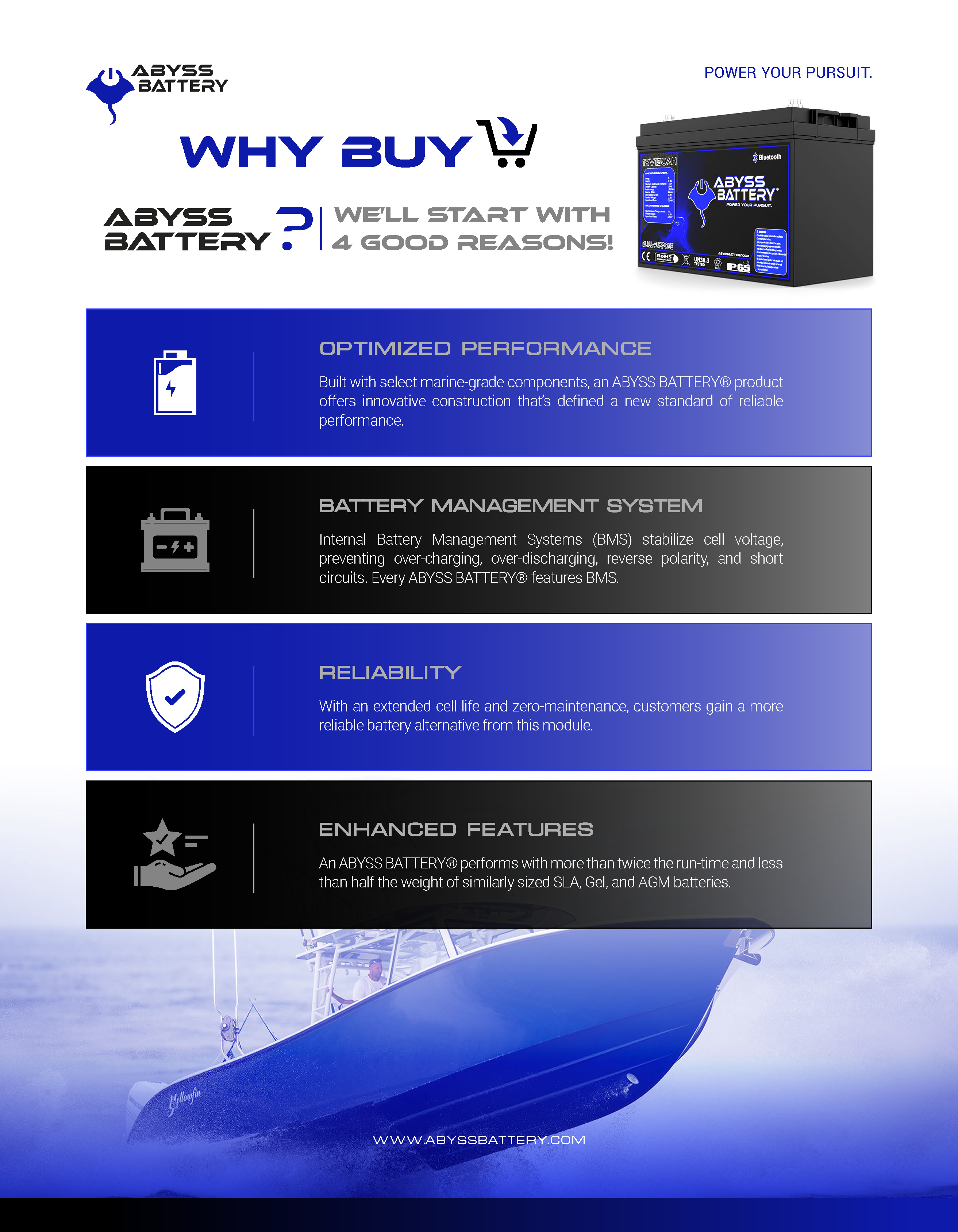
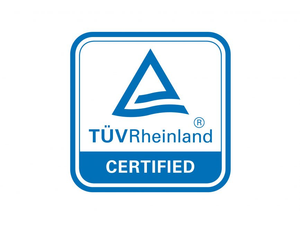
Abyss Battery®
Functional Safety
Abyss Battery®, Inc manufacturing process is compliant and licensed on a international
level by TÜV Rheinland for Functional Safety as a result of exposure to harsh marine
environments such as vibration, impact, ignition protection, water ingress and salt
spray corrosion common on pleasure craft and boats.
TÜV Rheinland stands for safety and quality in virtually all areas of business and life. TÜV
Rheinland’s highly qualified experts test technical systems and products around the world, support
innovations in technology and business, train people in numerous professions, and certify
management systems according to international standards.
In doing so, the independent experts generate trust in products as well as processes across global
value-adding chains and the flow of commodities. Since 2006, TÜV Rheinland has been a member
of the United Nations Global Compact to promote sustainability and combat corruption.
UN/DOT 38.3: Lithium Battery Transportation
ㅤ
All Abyss Battery®, Inc. Lithium Batteries are required to pass section 38.3 of the UN Manual of Tests and Criteria, to ensure the safety of using products for our end users and for shipping purposes. We are proud of our investment to ensure our products have been UN38.3 certified.
T1 – Altitude Simulation: This is low pressure testing that simulates unpressurized airplane space (cargo area) at 15,000 meter altitude. After storing batteries at 11.6kPa for >6 hours, these criteria shall be met: no mass loss, leaking, venting, disassembly, rupture or fire, and voltage within 10% of pre-test voltage.
T2 – Thermal Test: This test covers changes in temperature extremes from -40°C to +75°C. Batteries are stored for 6 hours at -40°C (12 hours for large cells/batteries), then 6 hours at +75°C (12 hours for large cells/batteries), for a total of 10 cycles. Testing may be performed in a single chamber or thermal shock chamber, but less than 30-minute transitions shall be used.
T3 – Vibration: This test simulates vibration during transportation. Test is a Sine Sweep: 7Hz – 200Hz – 7Hz in 15 Minutes; 12 Sweeps (3 hours); 3 mutually perpendicular axes.
T4 – Shock: This test also simulates vibration during transportation. Test is a Half-Sine pulse: 150G/6ms for small cells/batteries; 50G/11ms for large cells/batteries; 3 pulses per direction; 6 directions (+/-z, +/-x, +/-y). Same pass criteria as T1.
T5 – External Short Circuit: This test simulates an external short to the terminals of the cell or battery. At temperature of +55°C, apply short circuit (<0.1ohm) across terminals. Maintain at least an hour after sample temperature returns to +55 +/-2°C. Pass criteria are: Case temperature does not exceed +170°C and no disassembly, rupture, or fire within 6 hours of test. Fuse, current limiting circuit, and venting mechanism activation are allowable.
T6 – Impact: This test is only applicable to primary and secondary cells. For cylindrical cells >20mm diameter, it simulates impact to case of cell. For cylindrical cells <20mm diameter and all other cell constructions, it simulates crushing of a cell. Pass criteria for any type is: Case temperature does not exceed +170°C & no disassembly or fire within 6 hours of test.
T7 – Overcharge: This test is for secondary or rechargeable batteries only. It simulates an overcharge condition on a rechargeable battery: 2x the manufacturer’s recommended charge current for 24 hours. Then battery shall be monitored for 7 days for fire or disassembly.
T8 – Forced Discharge: This testing simulates a forced discharge condition for primary and secondary cells only.
Useful Links
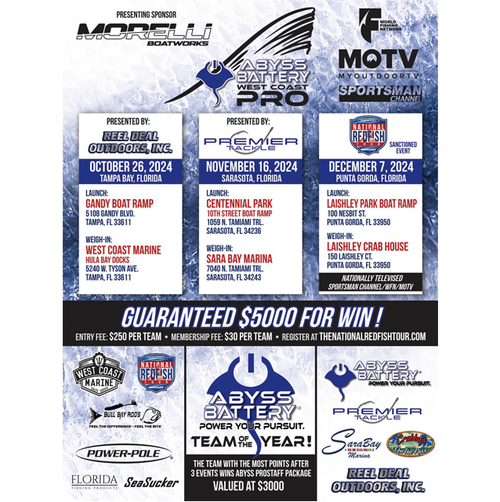
Angler Sponsorship Inquiry: Now Accepting 2025 Applications!
We are a company that understands how important sponsorship can be for any given athlete and will do everything it takes to support them with their sponsorships whether they are an individual competitor or someone working behind the scenes like a guide or tournament director.
Learn More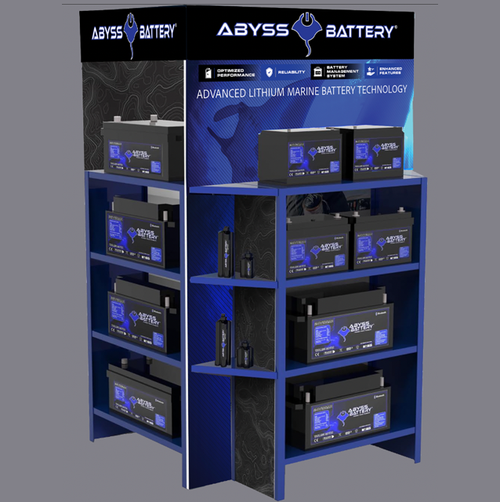
Become an Authorized Abyss Battery Dealer or Retailer
We design the best products and right programs that will help to grow your business. Our strong dealer network is one of Abyss' strategic advantages. We believe in building long-term partnerships with our dealers and we seek out those who believe in providing exceptional customer service.
Learn More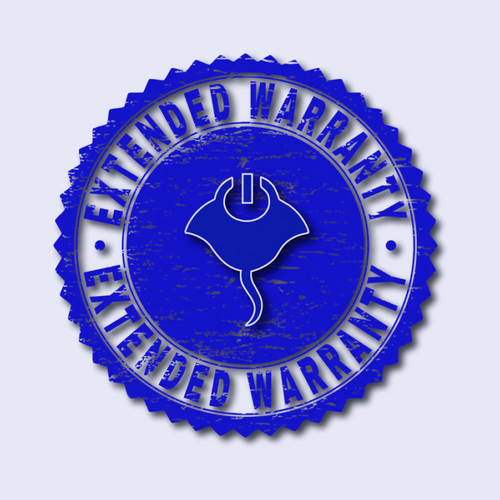
ReCharge+ Extended Battery Warranty Coverage
ReCharge+ from Abyss Battery® extends your Free 5-Year Replacement coverage by 2+ Additional years from your purchase date. You’ll get 24/7 priority access to our Battery experts by chat or phone and 50% off on a replacement battery for life!
Learn More
